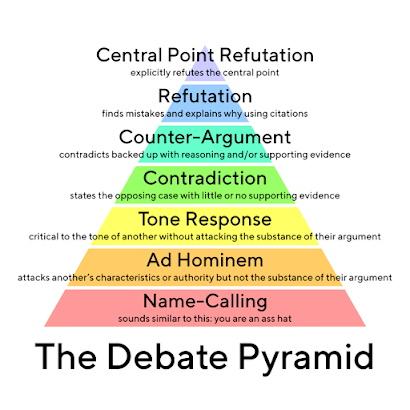But much of the political communication we receive will not be directly from the campaigns or political action committees. It will come from "friends" on social media. So how do we, as individual citizens, share our thoughts in a way that might actually persuade others?
Wednesday, August 26, 2020
The 3Ws of Political Messaging
But much of the political communication we receive will not be directly from the campaigns or political action committees. It will come from "friends" on social media. So how do we, as individual citizens, share our thoughts in a way that might actually persuade others?
Wednesday, August 19, 2020
Policies, not people
All over the place right now we hear name-calling and ad hominem attacks (attacks on who the people are, as opposed to the policies they support).
But arguments like that are a great way to alienate voters "in the middle" who have not yet made up their minds, because you are not just insulting the top-of-the-ticket candidates. You are insulting the undecided voters, themselves.
When you say things like:
You are un-American for supporting _______,
If you support that candidate, unfriend me.
You are gullible if you believe those lies.
If you do/don't wear a mask, you are stupid and maybe evil.
Who raised you?
Do you think you will shame people into changing their minds? It's not likely to happen.
If I tell you that you are stupid, does that open you up to new avenues of understanding? No, it makes you stubborn and it makes you close down and avoid different ways of seeing things.
Name-calling is satisfying because it allows you to express anger or fear, but it is not good persuasion. Attacking the candidates for their personality or background does nothing more than add further polarization in the minds of the people you are trying to persuade.
If you want to get people to change their minds, you need to engage with them and use evidence. People (such as voters) will use every tactic they can to AVOID admitting that they were wrong. Good persuasion opens the door to greater understanding, and greater understanding opens the door to changing ideas. Insults and attacks close down pathways that might change ideas.
If you want to change the ideas of people you know, don't insult them (or the candidates they may be considering). Engage with them and introduce them to persuasive evidence. Ask questions so you know what their actual perceptions and concerns are and focus your evidence toward these things.
Of course, phrase your questions so as to challenge their assumptions and point in the direction you want to go. More about that in another upcoming blog post.
Thursday, August 6, 2020
Teachers Have More Impact than they Know
Some things I'm thinking about:
1. Years ago, when I was a development officer for the USD Foundation, we had a prominent alum retire. I won't name him, but he was the chief financial officer for a major corporation that you would all realize. In reflecting on his retirement for the USD alumni newsletter, he named a business faculty member who he said had a profound impact on his career. When the teacher was asked, he didn't recall his former student at all, i.e. the guy hadn't been much of a standout in class, but he had been influenced anyway.2. I am also reminded of a movie few people will remember from 1980 called The Competition. In it, a character played by Lee Remick lists her pedigree as a piano teacher:"Ludwig Von Beethoven taught Carl Czerny, who taught Leschetizky, who taught Schnabel, who taught Renaldi, who taught me."
Teachers don't pour knowledge into people's heard. They create environments in which students can connect the dots and create new knowledge for themselves.
Saturday, August 1, 2020
Is the news media liberal? Yes, but not the way you think.
Read to find out why.



